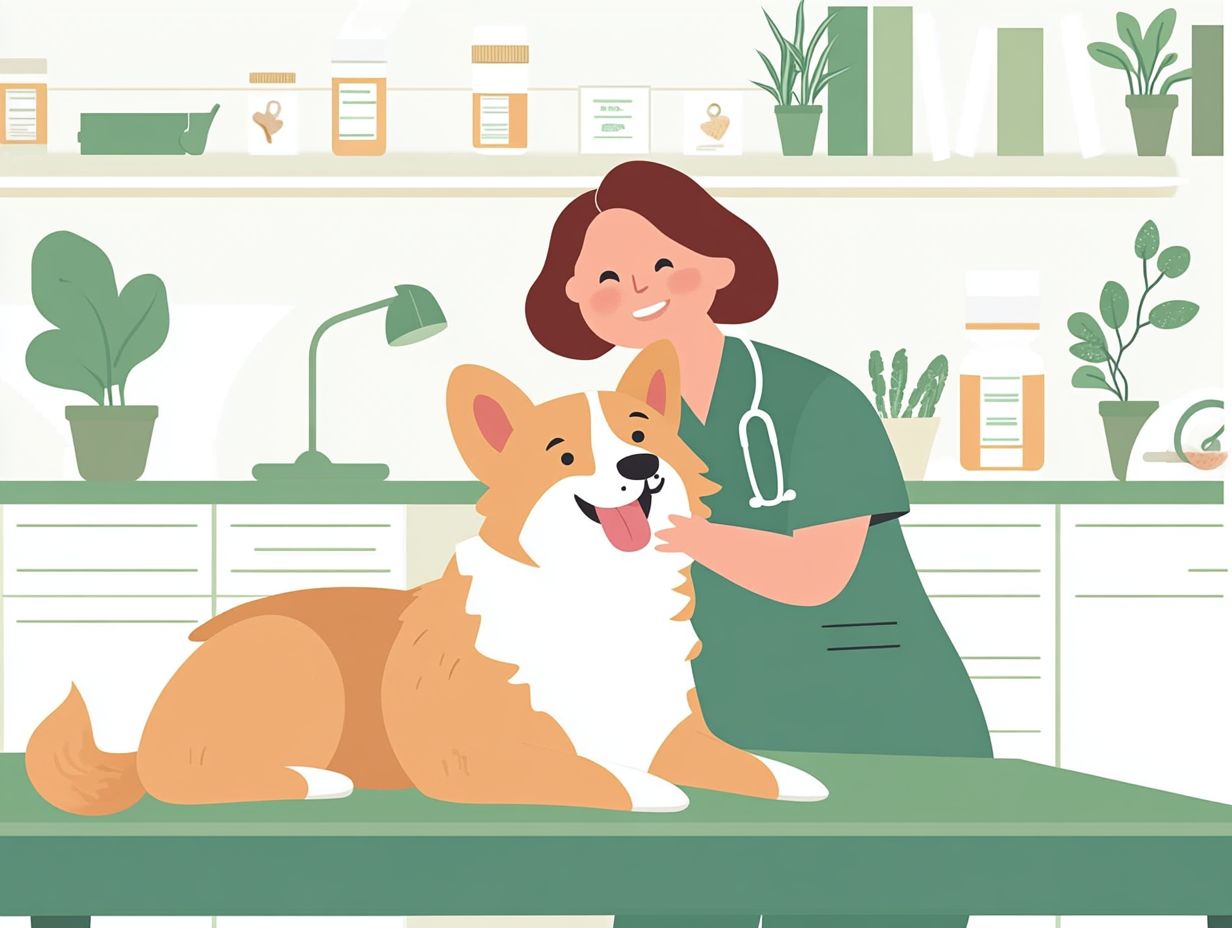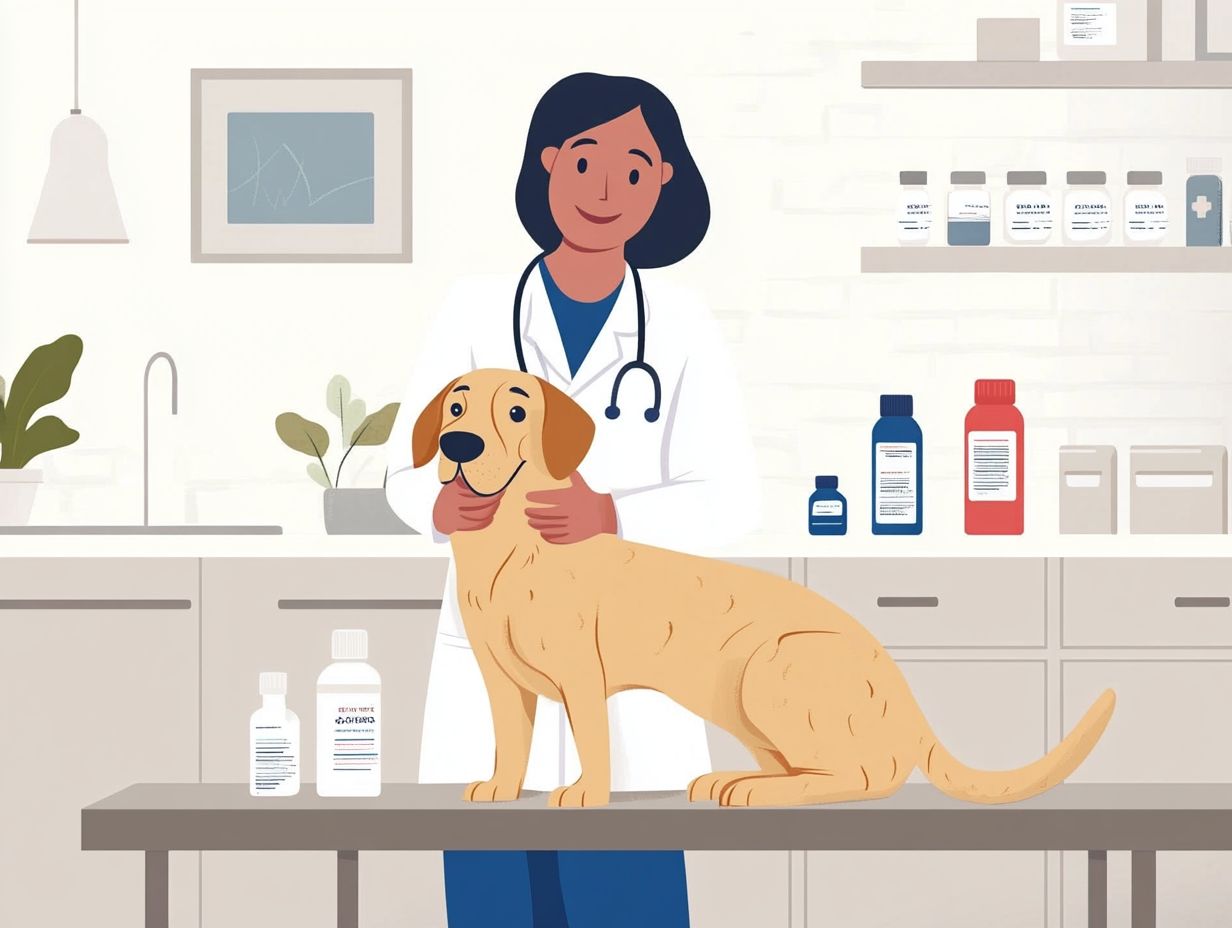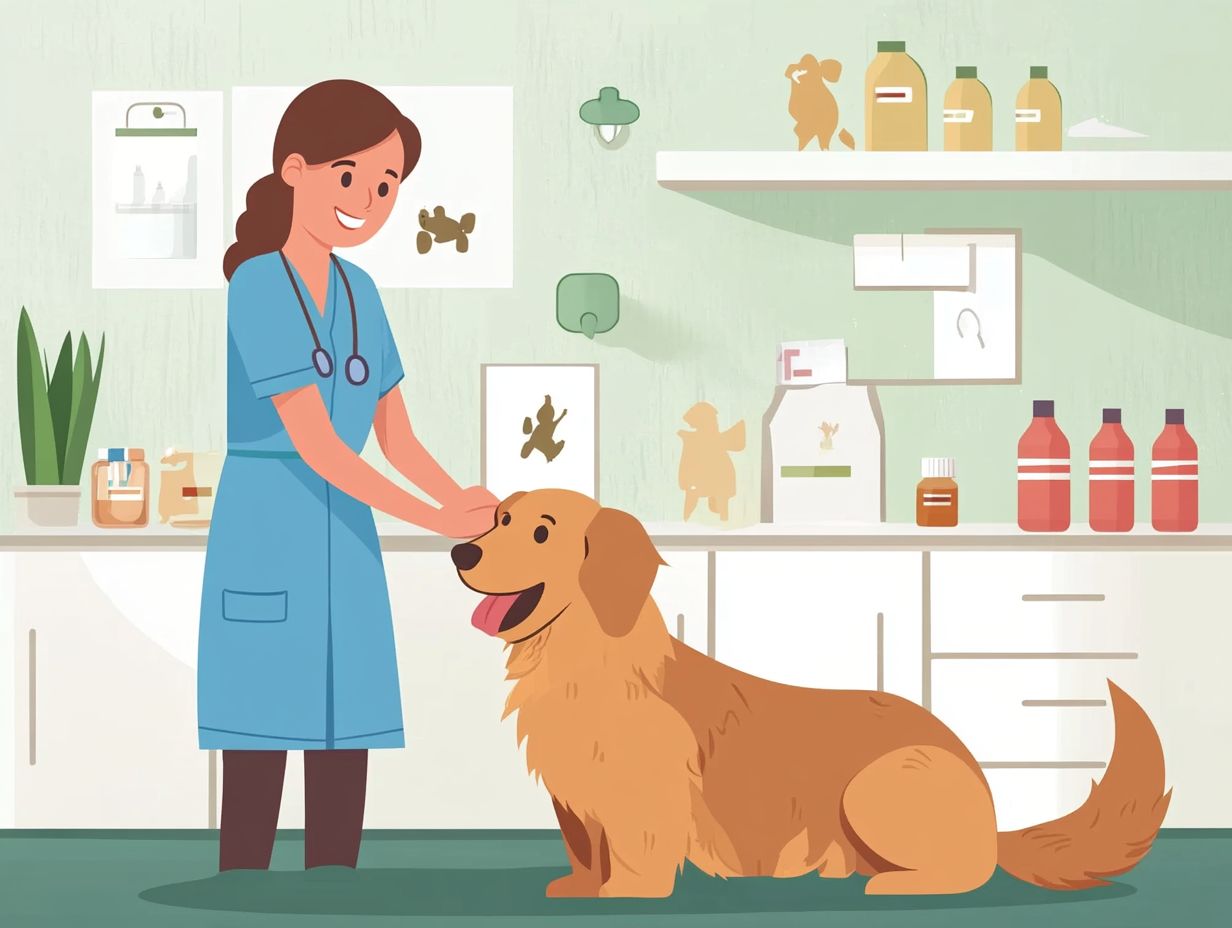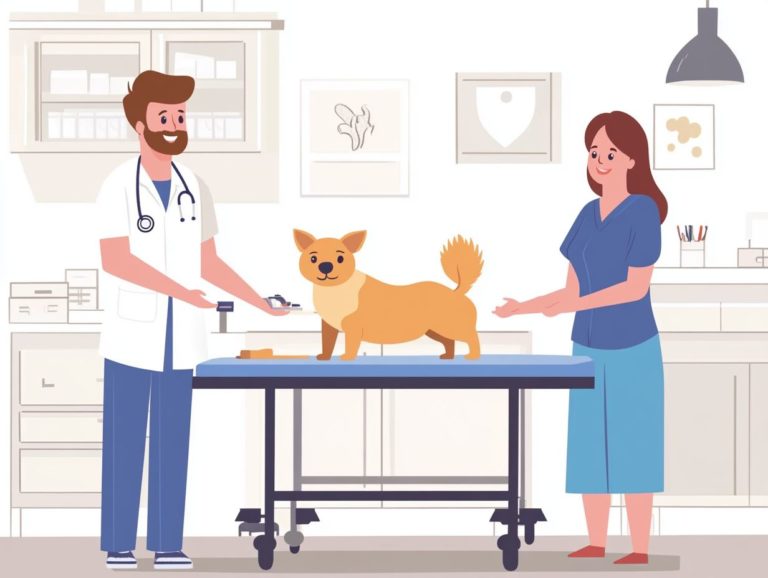What Are the Costs of Treating Pet Anxiety?
Is your pet feeling anxious? You’re not alone! Many pet owners face this issue. Pet anxiety is becoming an increasingly significant concern for pet owners, impacting not only the well-being of your beloved pets but also the overall harmony of your household.
Knowing the causes and symptoms is essential, serving as your first step toward discovering effective treatment options. Whether it’s medication, behavioral therapy, or natural remedies, there are multiple avenues available to help alleviate anxiety in pets.
The costs of these treatments can feel overwhelming. This article delves into the costs associated with various treatments, examines the factors influencing these expenses, and offers practical strategies to mitigate them, ensuring your beloved pet receives the necessary care without straining your budget.
Contents
- Key Takeaways:
- Understanding Pet Anxiety
- Treatment Options for Pet Anxiety
- The Financial Burden of Treating Pet Anxiety
- Factors Affecting the Cost of Treatment
- Location and Provider
- Ways to Reduce the Cost of Treating Pet Anxiety
- Discounts and Insurance
- At-Home Strategies
- Frequently Asked Questions
- How Much Should I Expect to Pay for Treating My Pet s Anxiety?
- What Factors Can Affect the Cost of Treating Pet Anxiety?
- Do Pet Insurance Plans Cover the Cost of Treating Pet Anxiety?
- Are There Any Low-Cost Options for Treating Pet Anxiety?
- What Are Some Potential Additional Costs Associated with Treating Pet Anxiety?
- Is Treating Pet Anxiety Worth the Cost?
Key Takeaways:

- Understanding the causes and symptoms of pet anxiety is crucial in finding the right treatment. This condition can present itself in various ways, including actions like chewing furniture or digging, excessive barking, or even physical symptoms like trembling or hiding.
- Treating pet anxiety can come with a significant financial burden, including costs for medication, therapy, and additional expenses.
- Factors like type of pet, severity of anxiety, and location can impact the cost of treatment, but there are ways to reduce these costs through discounts and at-home strategies.
Understanding Pet Anxiety
Pet anxiety is a significant concern that affects countless animals, resulting in various behavioral issues and impacting their overall emotional well-being. Environmental stressors like loud noises, shifts in household dynamics, or new family members can significantly affect your dog’s demeanor.
This condition can present itself in numerous ways, including destructive behavior, excessive barking, or even physical symptoms like trembling or hiding.
Understanding the underlying causes of pet anxiety be it separation anxiety, changes in the environment, or the fact that some dog breeds are more prone to anxiety is crucial for you as a pet parent seeking effective solutions.
By identifying the triggers of anxiety, you can provide the necessary support and interventions. Incorporating emotional support into your pet’s care plan can dramatically improve their ability to cope with anxiety and stressors in their environment, cultivating a happier, healthier living situation for your furry companions.
Causes and Symptoms
The causes of pet anxiety are multifaceted, ranging from environmental changes and past traumas to genetic predispositions. Symptoms often surface in various destructive behaviors.
For instance, environmental stressors like loud noises, shifts in household dynamics, or new family members can significantly affect your dog’s emotional well-being. Similarly, separation anxiety, which is commonly seen in pets left alone for long periods, can manifest as excessive barking, pacing, or even desperate attempts to escape.
Traumatic experiences, whether rooted in abuse, accidents, or sudden loud sounds, can leave lasting scars on a pet’s psyche, underscoring the importance of creating a nurturing and secure environment. By recognizing these triggers and symptoms such as excessive drooling, trembling, or withdrawal you can take proactive measures to alleviate your furry companion’s distress.
Treatment Options for Pet Anxiety
Addressing pet anxiety requires a complete plan that encompasses behavioral therapy, medications, and natural remedies, all meticulously customized to meet the unique needs of your pet.
Your vet can suggest helpful medications tailored to your pet s specific anxiety issues, providing effective relief.
Don t wait act now to help your furry friend feel secure! Start today to reduce your pet’s anxiety and improve their happiness!
Medication
Anxiety medications, such as Xanax, can be a vital asset in managing severe anxiety in your dog. However, consulting with a veterinarian is essential for appropriate guidance.
Vets can suggest different medications tailored to your pet s specific anxiety issues, including Selective Serotonin Reuptake Inhibitors (SSRIs), Trazodone, or even more natural options like CBD. Each medication works differently; some may gradually help regulate mood, while others offer immediate relief during particularly stressful events like thunderstorms or fireworks.
As you explore these options, be aware of potential side effects, such as drowsiness or gastrointestinal upset. This underscores the importance of veterinary oversight to ensure both the safety and effectiveness of managing your furry friend s anxiety.
Behavioral Therapy
Behavioral therapy can be an effective treatment option for addressing pet anxiety, focusing on methods to change behavior designed to enhance the emotional well-being of your anxious pets.
These techniques encompass a range of training exercises, each carefully tailored to address the unique anxieties that different pets might experience. For example, desensitization helps pets get used to things that scare them, while counter-conditioning changes their response to those fears. This effectively reduces their stress levels.
A veterinary behaviorist plays a pivotal role in this process, guiding you through the implementation of these therapies with a professional touch. Working together builds security for your pets and improves their behavior, creating a more harmonious living environment for both pets and their human companions.
Natural Remedies

Looking for natural ways to help your pet feel less anxious? Natural remedies for pet anxiety, such as herbal supplements and calming pheromones, present alternative options for managing anxiety without unwelcome side effects of medication.
These approaches can be particularly advantageous in crafting a holistic strategy to enhance your pet’s emotional well-being. Finding the right remedies often means tuning into your pet s unique needs and preferences, so it s essential to observe their behaviors and reactions closely. For instance, essential oils can create a soothing atmosphere, while natural supplements like chamomile or valerian root may help foster relaxation.
By seamlessly integrating these remedies into daily routines, alongside behavioral training and thoughtful environmental adjustments, you can develop a comprehensive plan that addresses anxiety from multiple angles, ultimately cultivating a sense of calm and security for your anxious pets.
The Financial Burden of Treating Pet Anxiety
The financial burden of addressing pet anxiety can weigh heavily on pet owners. Treatment costs include veterinary care, anxiety medications, and emotional support services. If you’re considering options, it’s important to understand what you should know about therapy for anxious pets. Medication costs for managing your pet’s anxiety can vary significantly, depending on the specific drugs your veterinarian prescribes and how often they recommend therapy sessions, adding to treatment costs.
Cost of Medication and Therapy
Medication costs for managing your pet’s anxiety can vary quite a bit, depending on the specific drugs your veterinarian prescribes and how often they recommend therapy sessions.
On average, you might find that monthly prescriptions range from $30 to $100. Some medications can even be pricier.
Behavioral therapy sessions also add to the costs, typically costing between $50 and $150 per session. Multiple sessions are often necessary for effective treatment.
Given this, it s essential to thoughtfully assess your budget before starting this process. Many veterinary insurance plans offer coverage for both medications and therapy, which can help offset a significant portion of these costs. This makes it easier for you to manage your furry companion’s anxiety.
Additional Expenses
When mapping out the complete financial landscape of pet ownership, you must consider all these factors to ensure your pet gets the best care. You should also factor in adoption fees and ongoing care expenses, as these can significantly add to your financial commitment.
Adoption fees for an emotional support animal can vary widely and may cover initial vaccinations and microchipping. However, the costs don t stop there.
You ll have recurring expenses like food, grooming, and training, all of which are essential for your pet s well-being. Regular veterinary visits are crucial! They help keep your pet healthy and address any anxiety-related concerns. These check-ups become another recurring expense you need to budget for.
Factors Affecting the Cost of Treatment
The cost of treating pet anxiety is influenced by several factors, including the type of pet you have, the severity of their anxiety, and the specific location and provider you choose for care.
Type of Pet
The type of pet you choose can significantly influence the treatment costs associated with pet anxiety. Some dog breeds tend to have more anxiety than others, making it important to recognize these tendencies early.
For instance, breeds like Labrador Retrievers and German Shepherds often experience heightened anxiety levels, which may require specialized care and behavioral therapies that can add to your financial burden.
On the other hand, smaller breeds like Chihuahuas may also show signs of anxiety but often respond better to simpler training techniques or less invasive treatments.
It’s wise for you to consider regular health check-ups with veterinarians who understand the unique psychological needs of your pet. Early intervention can lead to more effective and cost-efficient treatment options.
The costs of medications, anxiety wraps, or professional training sessions can vary widely based on the breed’s temperament and tendencies, so conducting thorough research is essential for anyone considering welcoming a pet into their home.
Severity of Anxiety

The severity of anxiety in pets significantly influences your treatment approach and the costs involved. When anxiety becomes severe, traditional methods like changing behavior through training might fall short, necessitating specialized therapies and possibly ongoing medication.
This increased complexity in treatment can lead to substantial financial considerations for you as a pet owner. If you’re confronting serious anxiety disorders, it s essential to explore personalized care strategies that cater to the unique behavioral traits of your pet.
Incorporating emotional support services, such as counseling for both pets and their owners, can be invaluable in crafting a complete care plan. This ensures that every facet of your pet’s anxiety is addressed in a holistic manner.
Location and Provider
The location and provider of veterinary care can significantly impact the treatment costs for pet anxiety. Regional differences often play a crucial role in your expenses.
You may find that different areas offer varying degrees of access to specialized services, such as animal health workers specifically trained in behavioral issues. For instance, urban centers typically host a greater concentration of these specialists, fostering competition that can drive up prices. In contrast, rural regions may lack such expertise, leaving you with fewer options. This can ultimately escalate your travel costs or delay effective treatment.
These factors can compound the overall financial burden associated with managing your pet’s anxiety.
Ways to Reduce the Cost of Treating Pet Anxiety
You can save big on treating pet anxiety by employing a variety of strategies. Consider taking advantage of discounts, exploring veterinary insurance options (a policy that helps cover your pet’s medical costs), and implementing effective at-home solutions.
Each of these approaches contributes to a more manageable expense while ensuring your pet receives the care they need.
Discounts and Insurance
Veterinary insurance and discounts can significantly ease the treatment costs for pet anxiety, allowing you to alleviate some financial stress that often accompanies pet ownership.
By covering therapy to help your pet’s behavior, medications, and regular consultations, this type of insurance serves as a reliable safety net during those challenging moments. You can find comfort in knowing that the unexpected expenses tied to your furry friend’s mental health won’t become an overwhelming burden.
Many providers extend discounts for multi-pet households or for those who opt for automatic payments, making it even more affordable. These financial perks can lead to substantial savings over time, enabling you to prioritize the well-being of your beloved pets without compromising your financial stability.
At-Home Strategies
Implementing at-home strategies can be an effective way for you to manage your pet’s anxiety, utilizing coping mechanisms that support their emotional well-being.
Providing a structured environment fosters a sense of security for your furry companion. Simple techniques, like establishing a calming routine that includes regular exercise and playtime, can significantly reduce anxiety.
Incorporating soft music or white noise can work wonders, soothing nervous pets and reinforcing positive behavior through rewarding training sessions that help them feel more confident. Providing a designated quiet space filled with comforting blankets and toys gives your pet a retreat during stressful moments, enhancing their overall sense of safety and emotional stability.
Frequently Asked Questions
How Much Should I Expect to Pay for Treating My Pet s Anxiety?

Treating pet anxiety can vary in cost depending on the methods used and severity of the anxiety. On average, pet owners can expect to spend between $200 to $1,000 for treatment.
What Factors Can Affect the Cost of Treating Pet Anxiety?
The cost of treating pet anxiety can be influenced by the type of treatment chosen, the number of sessions needed, and the location of the treatment facility.
Do Pet Insurance Plans Cover the Cost of Treating Pet Anxiety?
Some pet insurance plans may cover the cost of treating pet anxiety, but this can vary depending on the specific plan and coverage. It is best to check with your insurance provider to see if they offer coverage for this type of treatment.
Are There Any Low-Cost Options for Treating Pet Anxiety?
Some low-cost options for treating pet anxiety may include behavior modification techniques, over-the-counter supplements, or natural remedies. It is important to consult with a veterinarian before trying any treatment option.
What Are Some Potential Additional Costs Associated with Treating Pet Anxiety?
In addition to the direct costs of treatment, there may be additional expenses, such as medication, follow-up appointments, or behavior training classes. These costs should be discussed with the veterinarian beforehand.
Contact your veterinarian today to discuss the best options for your pet!
Is Treating Pet Anxiety Worth the Cost?
Treating pet anxiety can be expensive, but it’s often necessary for your pet’s health. Untreated anxiety can lead to serious health problems and lower their quality of life.
Investing in your pet’s mental health pays off over time. Take action now to ensure your furry friend feels safe and happy!






